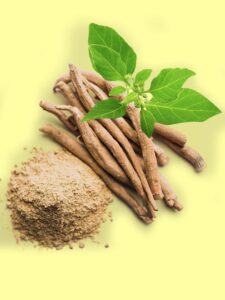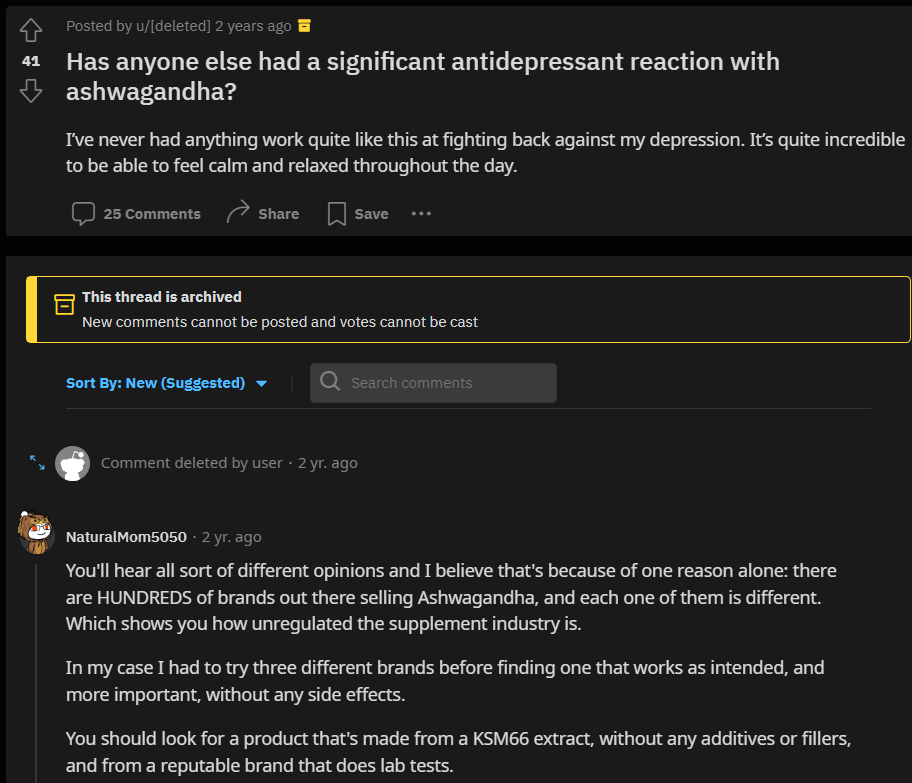Table of Contents
ToggleAre you taking antidepressants but still feeling overwhelmed and anxious? If so, you may want to consider adding Ashwagandha into your health regimen. As someone who has been living with depression for many years, I’ve done a lot of research on natural supplements that can help improve my mood and energy levels. And this is why I’m excited to share the potential benefits of Ashwagandha with those of you taking antidepressants.
In this article, we’ll dive into what scientific research says about how Ashwagandha can complement traditional treatment for mental health conditions like anxiety and depression. We’ll also explore the possible risks associated with taking it while on other medications as well as recommend some high quality sources in case you’d like to try it out for yourself! So if you’re curious about what this plant-based supplement could do for your long-term mental wellbeing, let’s get started!
The Science Behind Ashwagandha’s Effects on Mental Health

Ashwagandha, with its long history of use in Ayurvedic medicine, has proven to be a remarkable herb for combating anxiety and depression. Its adaptogenic properties make it an effective tool for modulating the body’s stress response. By reducing cortisol levels, which are often elevated during times of stress, ashwagandha helps bring balance to the body and mind.
But what exactly is an adaptogen? Well, think of it as nature’s way of helping us cope with the challenges life throws at us. Ashwagandha acts as a shield against the harmful effects of chronic stress by regulating our body’s physiological processes. It calms our overactive nervous system and promotes a sense of calmness and tranquility.
Furthermore, ashwagandha has been found to increase the production of serotonin – that feel-good neurotransmitter responsible for lifting our moods. By boosting serotonin levels in our brain, this herb can help alleviate symptoms such as sadness or hopelessness that often accompany anxiety and depression.
In conclusion, ashwagandha is not just some ancient remedy passed down through generations; it has scientific backing for its efficacy in treating anxiety and depression. With its ability to reduce cortisol levels and boost serotonin production, this adaptogenic herb offers a natural solution for those seeking relief from these common mental health concerns.
We have covered an extensive guide on Ashwagandha which includes ashwagandha and shilajit. Further to better understand the herb and its various uses, we have covered topics like ashwagandha and rhodiola supplement which you might be interested in.
Also, check out our recent posts: ashwagandha and tongkat ali
Complementary Benefits of Ashwagandha for Antidepressant Users
Antidepressants are often prescribed to individuals struggling with depression, but they don’t always provide the complete relief that people hope for. That’s where Ashwagandha comes in. This ancient herb, also known as Withania somnifera, has been used in traditional Ayurvedic medicine for centuries and is now gaining recognition in Western medicine.
Studies have shown that Ashwagandha can complement standard antidepressant medications by targeting specific symptoms that may not fully subside with medication alone. One of these symptoms is fatigue – a common side effect of depression and its treatment. Ashwagandha has been found to increase energy levels and reduce fatigue, helping individuals regain their vitality.
Lack of motivation is another challenge faced by many people with depression. Luckily, Ashwagandha may offer some relief on this front as well. Research suggests that it can improve motivation and productivity by boosting dopamine levels in the brain – a neurotransmitter responsible for pleasure and reward.
Cognitive impairment is yet another symptom that can persist even when someone is on antidepressants. But studies indicate that adding Ashwagandha to the treatment plan could help enhance cognitive function too. The herb has been found to improve memory, attention span, and overall cognitive performance in individuals struggling with depression.
In conclusion, if you’re currently taking antidepressants and experiencing lingering symptoms like fatigue, lack of motivation, or cognitive impairment – consider adding Ashwagandha to your regimen under medical supervision! Its natural properties might just give you the extra boost you need on your journey toward improved mental well-being.
You Might Like: https://realgoodgummies.com/how-to-cycle-ashwagandha
Potential Risks and Interactions with Antidepressant Medications

When it comes to our mental well-being, we all want to find that magic pill that can help us feel better and conquer the challenges of life. Ashwagandha has gained popularity as a natural remedy for anxiety and depression, offering the promise of a calmer mind and brighter outlook. While this herb is generally safe for consumption, caution should be exercised when using it alongside prescribed antidepressant medications.
You see, antidepressants work by targeting specific neurotransmitters in the brain, like serotonin or norepinephrine. They aim to restore balance and alleviate symptoms of depression. Now, ashwagandha also affects these pathways in the brain, but in a different way. It’s like inviting two chefs into your kitchen who have their own special recipes – there’s always a chance they might clash.
Has anyone else had a significant antidepressant reaction with ashwagandha?
by in Supplements
Combining ashwagandha with antidepressants can potentially lead to unwanted side effects or even reduce the efficacy of both treatments. You don’t want your quest for mental wellness to turn into an unexpected culinary disaster! That’s why it’s essential to consult with your healthcare provider before adding ashwagandha to your medication regimen.
Remember, just because something is natural doesn’t mean it automatically plays nice with everything else you’re putting in your body. Our brains are complex systems that need careful consideration when introducing new ingredients. So if you’re considering incorporating ashwagandha into your daily routine while on antidepressants, make sure you discuss it openly with your doctor or pharmacist first – they’ll help steer you towards the path of balanced mental health without any unintended culinary explosions along the way!
You Might Like: https://realgoodgummies.com/ashwagandha-and-maca-root
Finding High-Quality Sources of Ashwagandha
Before diving into the benefits of Ashwagandha, it’s important to note that if you are currently taking antidepressants, consulting with your healthcare provider is crucial. They will help ensure that adding Ashwagandha to your routine won’t interfere with any medications or treatment plans you have in place.
Now, let’s talk about why sourcing high-quality Ashwagandha products is vital. When it comes to supplements, not all brands are created equal. Third-party testing certifications guarantee that what’s on the label matches what’s inside the bottle. This helps eliminate any doubts about purity and safety.

Additionally, opting for organic or sustainably sourced options can provide added peace of mind. Organic certification ensures that the product was produced without synthetic fertilizers or pesticides, reducing exposure to potentially harmful chemicals.
When choosing an Ashwagandha supplement as a companion to your antidepressant therapy, consider checking for these quality markers:
- GMP Certification: Good Manufacturing Practices ensure consistent quality throughout production.
- Natural Extraction Methods: Look for brands using gentle extraction techniques like water or ethanol instead of harsh solvents.
- No Additives or Fillers: Avoid products with unnecessary additives and fillers that may dilute effectiveness.
In conclusion, incorporating Ashwagandha alongside antidepressants can potentially offer additional support in managing stress and promoting overall well-being. However, it is important to prioritize sourcing high-quality products from reputable suppliers while considering any potential interactions with existing medications under professional guidance.
You Might Like: https://realgoodgummies.com/ashwagandha-withdrawal-things-you-must-know
Dosage Recommendations for Combining Ashwagandha with Antidepressants
When it comes to finding the right dosage of Ashwagandha while on antidepressant medication, there is no one-size-fits-all answer. Each person’s body responds differently, making it crucial to seek guidance from a healthcare professional who can tailor their advice specifically for you.
A knowledgeable healthcare provider will take various factors into consideration before recommending an appropriate dosage. Firstly, they will evaluate your current medication dosage and any existing health conditions that may impact how your body metabolizes substances. It’s important to remember that Ashwagandha interacts with certain enzymes in the liver, which can affect how medications are broken down.
In addition, a healthcare professional will examine potential drug interactions between Ashwagandha and your antidepressant medication. Some combinations can lead to adverse effects or reduce the effectiveness of either substance. Therefore, seeking expert advice is essential for avoiding any unwanted complications.
By consulting with a healthcare professional who understands both your medical history and the complexities of herbal supplements like Ashwagandha, you can ensure personalized guidance tailored to your unique situation. Together with their expertise and knowledge about potential interactions or contraindications, they will help determine the most suitable dosage for you.
To summarize:
- Determining the right dose of Ashwagandha while on antidepressants is challenging due to individual variations in response
- Consulting with a healthcare professional is recommended for personalized guidance
- The ideal dose depends on factors such as medication dosage, existing health conditions, and potential drug interactions
- Expert advice helps prevent complications and ensures an appropriate dosage specific to your needs
You Might Like: https://realgoodgummies.com/ashwagandha-gummies-for-sex
Taking Ashwagandha: What to Expect
Ashwagandha, a herb that has been used for centuries in Ayurvedic medicine, has gained popularity in recent years for its potential health benefits. While it may not be a magical cure-all, many users have reported experiencing positive effects from taking this herbal supplement.
One of the most frequently mentioned benefits of Ashwagandha is its ability to reduce stress levels. In today’s fast-paced world, we all experience stress at some point or another. Ashwagandha acts as an adaptogen, helping the body cope with stress by regulating cortisol levels and promoting relaxation.
Another area where Ashwagandha seems to shine is improving sleep quality. If you’ve ever struggled with getting a good night’s rest, you know how important it is for your overall well-being. By calming the nervous system and reducing anxiety, Ashwagandha can help promote better sleep patterns and wake up feeling refreshed.
Mood stability is also on the list of reported benefits of using Ashwagandha. Whether it’s due to hormonal imbalances or external factors like work or relationships, mood swings can take a toll on our mental health. Some studies suggest that Ashwagandha may help regulate neurotransmitters involved in mood regulation like serotonin and dopamine.
Lastly, many users claim that taking Ashwagandha has given them an energy boost without causing jitters or crashes commonly associated with caffeine-based products. This natural increase in energy can be attributed to several factors such as improved sleep quality and reduced stress levels.
In conclusion,
while individual experiences may vary when supplementing with ashwagandha , there are several common benefits reported by users including reduced stress levels enhanced mood stability increased energy levels
improved sleep quality
The Importance of a Holistic Approach in Mental Health Management
When it comes to taking care of our mental health, we all know that there is no one-size-fits-all solution. It’s a journey filled with ups and downs, twists and turns. So, when considering adding natural supplements like Ashwagandha to your regimen, it’s important to approach it as just one piece of the puzzle.
Imagine this: you’re building a beautiful garden. You start by preparing the soil – that’s therapy, where you dig deep into your emotions and thoughts with a trained professional by your side. Then, you carefully choose the seeds – those are healthy lifestyle choices like exercise, good sleep habits, and nourishing foods that fuel both body and mind. And let’s not forget about the water – open communication with healthcare providers who can help guide you on this journey.
Now here comes Ashwagandha – a gentle breeze weaving through your garden beds. It can provide an extra layer of support for some individuals struggling with stress or anxiety. But remember, just like every plant in your garden requires different conditions to thrive, so too do our minds require personalized approaches.
So take your time in finding what works best for you – whether it be Ashwagandha or any other supplement – because mental health is unique to each individual. Embrace this comprehensive approach as you tend to your own beautiful mind garden!
FAQ
1. Can I take Ashwagandha while on antidepressants?
Yes, in most cases, it is safe to take Ashwagandha alongside antidepressant medications. However, it is crucial to consult with your healthcare provider before adding any supplements to your regimen.
2. How does Ashwagandha interact with antidepressants?
Ashwagandha may enhance the effects of certain antidepressants and help alleviate symptoms such as stress and anxiety. It works by regulating neurotransmitters like serotonin and dopamine in the brain.
3. Are there any potential side effects of combining Ashwagandha with antidepressants?
While generally well-tolerated, some people may experience mild side effects such as digestive issues or drowsiness when taking both Ashwagandha and antidepressant medications simultaneously. Monitor your response and inform your doctor if you notice any adverse reactions.
4. How long does it take for Ashwagandha to show benefits for individuals on antidepressants?
The time frame can vary depending on several factors, including dosage, individual biochemistry, and the specific type of depression being treated. Typically, improvements from taking Ashwagandha alongside antidepressants can be observed within a few weeks.
5. Is it necessary to adjust my current dosage of antidepressant medication when starting Ashwagandha?
It’s essential not to change your prescribed dosage without consulting a healthcare professional first. They will evaluate whether adjusting the dose is appropriate based on your unique circumstances and medical history.
Dr. Susan Francis is a passionate medical professional with over 4.5 years of experience in the field. She received her medical degree from the University of Michigan and completed her residency at the Mayo Clinic.
In addition to her clinical work, Dr. Francis has a strong interest in medical writing and editing. She has edited numerous articles for medical journals and is a regular contributor to several healthcare publications.
Dr. Francis is committed to promoting accurate and accessible medical information to the public. In her free time, she enjoys staying up to date on the latest medical research and volunteering at local healthcare clinics.
- October 3, 2023
- October 3, 2023










